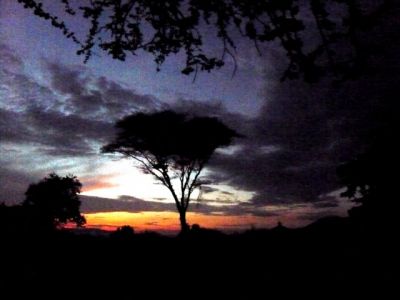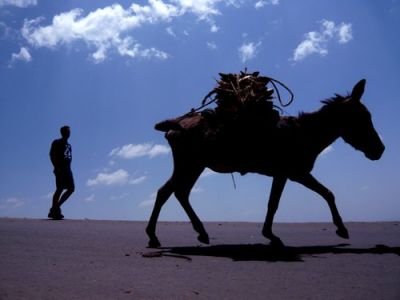 IT will take three days by Land Cruiser to the Lower Omo Valley, one of the most culturally diverse regions on the planet. 53 nations live in Southern Ethiopia, most with unique customs and traditions, as different from western life as whales are to shitsus. It takes some time to navigate out of Addis, stuck behind trucks and buses puking thick black smoke directly into the back of our throats. There are cows in the middle of the road, herds of goats, overloaded donkeys. Children run in front of the car, and before long, we see the first of many road kill, a donkey, split in half in the middle of the road. Our driver Ayalew honks repeatedly, at animals and people - the road is an obstacle course requiring absolute concentration. Bob Marley on the iPod, we leave the city behind, the lanes become narrower, but the countryside is lush with all the shades of green from the rainy season. After a few hours, the asphalt disappears into a strip of never-ending craters. Tin shacks become mud houses become wooden huts with thatch ceilings. Small towns are crowded with people and livestock. Kids play ping pong and foozball under the shade of trees. Shacks sell everything, and the only building that looks like it's from this century belongs to the ominously sounding Ethiopian Insurance Corporation. Hand painted street signs show donkey carts, and celebrate" Happy Millennium", and show a dead baby, and the only word I can recognize is AIDS. Ethiopian writing is all dashes and squiggles, with English words appearing occasionally and usually misspelt. After 250km, we drive through Shashamane, welcomed by a hand painted billboard of Bob Marley. Rasta colours are prominent, as are tall foreign men, their dreadlocks towering over locals. IT will take three days by Land Cruiser to the Lower Omo Valley, one of the most culturally diverse regions on the planet. 53 nations live in Southern Ethiopia, most with unique customs and traditions, as different from western life as whales are to shitsus. It takes some time to navigate out of Addis, stuck behind trucks and buses puking thick black smoke directly into the back of our throats. There are cows in the middle of the road, herds of goats, overloaded donkeys. Children run in front of the car, and before long, we see the first of many road kill, a donkey, split in half in the middle of the road. Our driver Ayalew honks repeatedly, at animals and people - the road is an obstacle course requiring absolute concentration. Bob Marley on the iPod, we leave the city behind, the lanes become narrower, but the countryside is lush with all the shades of green from the rainy season. After a few hours, the asphalt disappears into a strip of never-ending craters. Tin shacks become mud houses become wooden huts with thatch ceilings. Small towns are crowded with people and livestock. Kids play ping pong and foozball under the shade of trees. Shacks sell everything, and the only building that looks like it's from this century belongs to the ominously sounding Ethiopian Insurance Corporation. Hand painted street signs show donkey carts, and celebrate" Happy Millennium", and show a dead baby, and the only word I can recognize is AIDS. Ethiopian writing is all dashes and squiggles, with English words appearing occasionally and usually misspelt. After 250km, we drive through Shashamane, welcomed by a hand painted billboard of Bob Marley. Rasta colours are prominent, as are tall foreign men, their dreadlocks towering over locals.
Each kilometre along the bone shaking, acacia-tree lined dirt road seems to wipe another century off humanity's recent progress. No glass, no cement, no electricity, or phones, or wide screen TV's. No tennis courts and swimming pools, no basements, no driveways, nor cars to drive them. No windows or patios, or dishwashers and washing machines. Forget about laptops, battery-powered toothbrushes, mattresses, linen, or bathtubs. Throw out the microwave, blenders, desks, cabinets and sofas. Here we are exactly how we were, before words like Globalization, or the Renaissance, or the Industrial Revolution, or Cyberspace. Living in round huts, working fields during the day, sleeping around a fire in the dark, using wooden headrests as pillows, on a bed of thin, dried animal skin. Then a mosque, with a single minaret, and the huts have a crescent symbol above. After the Eastern Orthodox Church, Islam is the country's second religion, and unlike the civil war in neighbouring Sudan, Christians and Muslims live in peace. The purpose of the road trip is to visit tribes along Ethiopia's Rift Valley, and the Alaba, would be the first. The Land Cruiser pulls up, and immediately we are surrounded by desperate, impoverished looking people. Children are wearing western style clothes that resemble rags, torn and filthy. Hands are out. I feel sick to my stomach, and so it begins.  However right, moral and well intentioned, the fact that you are expected to pay money to locals for photographs has hideously backfired in Ethiopia. I see nothing wrong with remunerating someone who appears in my photographs. It's only fair to reward them for the right to capture their image. The problem is that it has become a business in this country, encouraging desperate people to appear in tourist photos as a means of making easy money. When I take pictures of people in foreign countries, I aim to capture an image that speaks, ( a thousand words?) about life, and the people who live it. It is never the intention to manipulate people, or take photos of them without their permission. I look for the authentic, the real, the moment. So consider the impact of a mob demanding I take their photo, and pay up seconds after I do. Gone are the moments of people being people, replaced by people doing whatever it is that will get foreigners to pull out their cameras, and their wallet. It's undeniable exploitation, by both parties, and the result left me taking timeless pictures with an accompanying memory I'd rather forget altogether. One of many examples: We stop to join a group of locals on a donkey cart on the side of a highway. I ask first for permission, and then how much it will cost for the fare. I am told 20 birr. Julia and get on the cart and the poor donkey heaves on, a few pictures are taken. People are laughing and smiling and I feel generous so I pull out a 50 birr note (about $5). What ensued was a pushing match, the group turning on each other, demanding more money, grabbing me from all directions, literally ripping the money out of my hands. I was threatened, shoved, and had to run for the safety of the car. All because I wanted a photo, for which I was prepared to overpay the agreed price by more than double! How could it not taint an experience? As one guy told me in Jinka: However right, moral and well intentioned, the fact that you are expected to pay money to locals for photographs has hideously backfired in Ethiopia. I see nothing wrong with remunerating someone who appears in my photographs. It's only fair to reward them for the right to capture their image. The problem is that it has become a business in this country, encouraging desperate people to appear in tourist photos as a means of making easy money. When I take pictures of people in foreign countries, I aim to capture an image that speaks, ( a thousand words?) about life, and the people who live it. It is never the intention to manipulate people, or take photos of them without their permission. I look for the authentic, the real, the moment. So consider the impact of a mob demanding I take their photo, and pay up seconds after I do. Gone are the moments of people being people, replaced by people doing whatever it is that will get foreigners to pull out their cameras, and their wallet. It's undeniable exploitation, by both parties, and the result left me taking timeless pictures with an accompanying memory I'd rather forget altogether. One of many examples: We stop to join a group of locals on a donkey cart on the side of a highway. I ask first for permission, and then how much it will cost for the fare. I am told 20 birr. Julia and get on the cart and the poor donkey heaves on, a few pictures are taken. People are laughing and smiling and I feel generous so I pull out a 50 birr note (about $5). What ensued was a pushing match, the group turning on each other, demanding more money, grabbing me from all directions, literally ripping the money out of my hands. I was threatened, shoved, and had to run for the safety of the car. All because I wanted a photo, for which I was prepared to overpay the agreed price by more than double! How could it not taint an experience? As one guy told me in Jinka:
"The money makes everybody go crazy!"
"All they know of ferengis is of NGO's and tourists," Da Witt, tells me over coffee in Addis. He's a local nutritionist who works for an NGO. Like our guides and drivers, he laughs off the Ferengi Frenzy, as it is called, but there is little doubt it has left a negative impact on our team. There is an Ethiopia where it is customary to refuse gifts and handouts. There is an Ethiopia where people care and support one another, are warm and open and friendly to strangers, eager to learn from each other. Unfortunately, if you're a tourist in town for two weeks and plan on visiting locations suggested by a tour agency, chances are you won't see it. Continue Robin's full Ethiopia Report at his website: moderngonzo.com
< back to the episode
< back to the list of articles |

